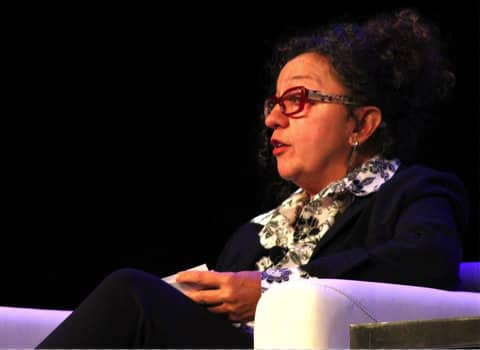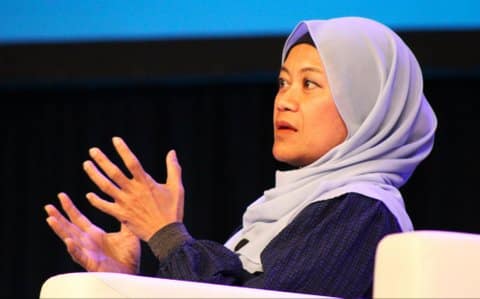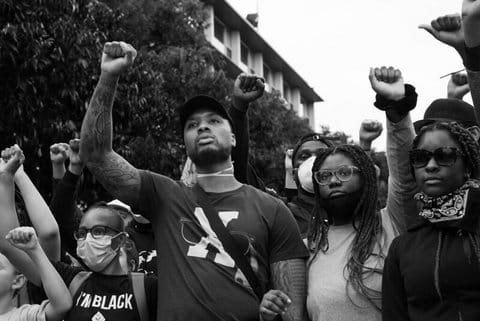
24 Mar ‘Brotherhoods of the Disengaged’: How Former Members Can Help Stop Hate Groups

Myrieme Churchill spoke at the Eradicate Hate Global Summit about how she helps former violent extremists and their families reintegrate into society as executive director of Parents For Peace. (Joe Porrello / The CC Pulse)
Editor’s note: The Eradicate Hate Global Summit began in 2021 in response to the mass shooting at the Tree of Life synagogue. Last year, The CC Pulse was there for the first time in service of our Stop the Hate coverage. This is one of many stories we will publish that is about or inspired by the summit.
By Joe Porrello
PITTSBURGH — Efforts to reduce hate group activity need to have former members at the center.
This was the general consensus of a panel featuring a onetime undercover FBI agent, a college professor and two activist leaders who spoke at the Eradicate Hate Global Summit last September.
Panelists said that while attempts to decrease hate are usually aimed at mainstream society, tailoring messages to potential recruits and current members of hate groups would be more effective.
There are many groups to be reached. The Southern Poverty Law Center tracked 1,225 extremism and anti-government factions in the U.S. in 2022, 103 of which were based in California. The number has risen in the last two decades, with 29 hate groups in California during the year 2000 and 68 in 2010.
Just as the increase in extremism has happened over time, so too will the minimization of it take time, said Julie Chernov Hwang, an associate professor of political science at Goucher College in Maryland. The process of helping someone out of a hate group and into a better mental state before reintegrating them with society can’t be rushed.
“Disengagement, rehabilitation, reintegration, all of this takes time,” she said. “It’s not going to happen over a one-fiscal year budget. We have to think about it in the long term.”
And the process will likely require the help of mental-health professionals.
“They may need trauma-informed therapists who can help them on this journey,” she said.
Katharina Meredith, executive director of activism group Stronger After, said extremists have few people they can rely on, which makes outside help crucial. She said they may have alienated themselves from all close relationships, trashed their belongings, quit their careers, and moved to a new place — making them more reliant on the hate group.
“Sometimes the safest thing … to do is pretend like everything is fine…Acknowledging they’re unhappy or trying to leave can be a big risk to them,” said Meredith. “Even as membership starts to have negative consequences, whether it’s (to their) psychological health or on a practical level, if they don’t have many options, they might stay.”
Intervention can help but is often not well-received, according to Meredith. Group leaders study negative rhetoric about their factions, then brief followers on what the outside world will try to tell them and convince them it is untrue.
“You are inoculated against reason from the very beginning. You’re told you’re better than the rest of the world,” said Meredith. “Messaging is not going to fall on fertile ground; that is not to say we should stop trying.”
A former cult member told her that messages contradicting the ideology can add up until one ends up being the breaking point.
“It all comes crashing down…That might be the moment somebody either mentally starts to deradicalize or physically disengages,” said Meredith.
Myrieme Churchill works in extremism disengagement as executive director of Parents For Peace, which aids people worried about someone becoming involved with extremism. It offers guidance and early intervention, raises public awareness, and advocates for effective policy solutions.
“The reason we ended up doing this is because a lot of those families had no idea what to do,” she said.
>>>Read: ‘Closer and Closer to Losing Him Forever’: Hate Groups Prey on Young Men, Tear Families Apart
Its strategies cannot be universal because, as Churchill said, the organization gets calls to its helpline from all different types of ideologies.
“Among our white supremacists, we have people that are Latino, Black and Muslim,” she said, also mentioning members of neo-Nazi groups who are Jewish or part of the LGBTQ+ community.
While some young recruits stick to one particular group or come from troubled homes, many extremists move from one ideology to another and come from well-educated and respected families, according to Churchill, and they all need to be reached.
Retired FBI agent Scott Payne, who went undercover in hate groups for years, agreed: “It’s not a cookie-cutter situation; everybody is different.”
Payne said hate group members can have a lot in common, though. They’re often bullied or have few close relationships and get exploited by extremist leaders as they fall down the rabbit hole of hate online.
“You get somebody heading one of these groups, and that’s what they’re going to prey on,” he said.
Churchill said hate groups draw people in by amplifying their trauma.
“It turns out recruiters are doing a great job at effective listening… what I call a microphone to the pain,” she said.
After spending so much time with extremists, Payne knows what works and what doesn’t when it comes to reaching radicalized people.
“Doing this undercover stuff, you’re making friends with some pretty bad people,” he said.
>>>Read: Unexpected Friendship Illustrates Power of Personal Connection in Stopping Hate
Payne ended up becoming friends for real with one of the men he was looking into. After over a year’s worth of investigating, Payne approached the man, who had not committed any federal crimes, and tried reasoning with him to leave his group. It worked.
“Essentially, I flipped the guy, and we became buddies,” he said.
Payne asked the man to work with him to try to reduce hate, given his experience with extremism.
“I was just gearing him up — I didn’t know there was such a thing as a former until last year when I came here,” he said. “They should be involved.”
Others with similar experience in hate groups who get involved in advocacy work can be instrumental in reducing hate, said Hwang.
“It’s really exciting. I think we can learn so much from them,” she said. “Increasingly, disengagement programs and reintegration programs are being led by formers.”
Hwang pointed to ex-extremists who help parents ensure their imprisoned child has support from someone who understands what they’re going through, making them less likely to return to the group they were radicalized by post-incarceration.
>>>Q&A: How Youth Become Radicalized and What to Do
“They’re creating their own brotherhoods of the disengaged, and they’re reintegrating. They’re creating their own support networks,” she said. “These men are listened to because they have the street cred… they know what buttons to push, and they can do incredible things.”
Hwang noted the work of Ali Fauzi. A former convicted terrorist whose brothers orchestrated the 2002 Bali bombings, he founded Lingkar Perdamaian (Circle of Peace), a foundation that helps former radicals and militants reenter society and facilitates cognitive and behavioral changes in current terrorist inmates throughout Indonesia. It helps affected families through numerous initiatives including literacy classes, skills training, dialogue and home visits.
“This is what formers can do. I could not walk in there and do that,” said Hwang. “They could do it because they had gone through the process.”
Churchill said the assistance of former extremists could take the pressure off authority figures who mean well but often push the person closer to whatever hateful ideology they believe in.
Many former hate group members have accredited acts of kindness to them exiting extremism, according to Meredith. She said such acts are crucial because militias convince their members that nobody else likes them, so perceived outsiders giving them care often causes a breakthrough.
According to Meredith, people need to see that those involved with extremism are still human and that they have room to change for the better.
“As long as we can keep that conversation going in any way and keep reaching out, that will mean a lot and also make it easier for them to reengage with society,” she said.
Regardless of preventative tactics, it is ultimately up to the radicalized person to change their ways, said Payne. He said some hate group members will ignore any outsider kindness or advice regardless of how it is delivered — even if the person trying to help is a former extremist.
This resource is supported in whole or in part by funding provided by the State of California, administered by the California State Library in partnership with the California Department of Social Services and the California Commission on Asian and Pacific Islander American Affairs as part of the Stop the Hate program. To report a hate incident or hate crime and get support, go to CA vs Hate.





No Comments